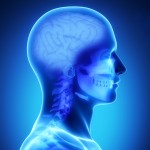Traumatic Brain Injury – The Unseen Injury from Accidents

We’ve become aware about injuries to our brains. There’s been quite a bit of publicity about them in some contexts. We hear about football players getting concussions and having problems, both short term and long term. We know to make our kids wear helmets when they ride their bikes or go skate boarding, but nobody wears helmets when they ride in a car. You can injure your brain when you are involved in a car accident and you may not even realize it. Safety belts and air bags all help, but they cannot eliminate the possibility of what is call a “mild traumatic brain injury” in a car crash.
Your brain is held in place inside a hard shell we call your skull. Sometimes in a car crash people hit their head on the door frame or window or even the steering wheel or dash, or even just get it shaken hard. When this happens, the brain bangs up against the inside of the skull and then rebounds and bounces off (or collides against) the opposite side of the skull and as a result you can get a traumatic brain injury (TBI). When you or a family member is in a car crash and receives this type of injury, the diagnosis can sometimes be missed. The person may, in fact, appear normal. The symptoms may not be present initially or present and not noticed in their initial treatment. In fact, the person effected may not even notice the symptoms themselves – often friends or family members are the first to notice them.
So what are the symptoms? Well, they vary and can be different in different people AND you don’t have to exhibit all of them. However, they can include some of the following: headaches, fatigue, memory loss, poor attention or concentration, sleep disturbance, dizziness or loss of balance, irritability or emotional disturbance, feelings of depression, getting lost or confused when you are driving or even when you walk to into another room and don’t know why, and slowness in thinking or just feeling foggy.
Do you have to be knocked unconscious? No, you can be, but you don’t have to be. Have you ever heard the phrases “getting your bell rung” or “seeing stars from a hit”? These sometimes can lead to a mild brain injury.
When the symptoms are noticed, what should you do? You need to tell your doctor immediately. He or she can then observe you and, where appropriate, refer you to an expert who specializes in the treatment of these injuries. One such expert is called a “neurologist” and another is a “neuropsychologist”. Sometimes the symptoms will last only a few weeks or a few months, but sometimes they can last for many months or even be permanent. The key though is recognizing the issue and seeking treatment.

